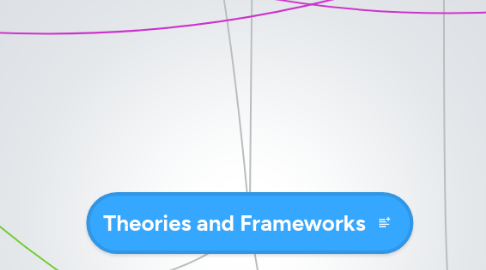
1. Technology Theories
1.1. Media Ecology
1.1.1. Basics Principles
1.1.1.1. Media logic, medium theory and mediology.
1.1.1.1.1. The idea that technology and techniques, modes of information and codes of communication play a leading role in human affairs.
1.1.1.2. The study of media as environments.
1.1.1.2.1. How media of communication affect human perception, understanding, feeling, and value
1.1.2. Implications For Education
1.1.2.1. Media environments are more often implicit and informal,
1.1.2.2. Education and learning are working around technology
1.1.3. Key Theorists
1.1.3.1. Postman and McLuhan
1.2. SCOT
1.2.1. Basics Principles
1.2.1.1. Human action shapes technology
1.2.1.2. Seek to understand the reasons for acceptance or rejection technology
1.2.1.3. Formalizes the steps and principles to follow when one wants to analyze the causes of technological failures or successes.
1.2.1.4. Principle of Symmetry
1.2.1.4.1. Origins of scientific beliefs
1.2.2. Implications For Education
1.2.2.1. Ignores the consequences of the technologies.
1.2.2.1.1. Assumes students have prior knowledge of technologies required for class
1.2.2.2. Superficial and only responds to immediate needs of students
1.2.2.3. Indifferent
1.2.2.3.1. Unhelpful in addressing important debates about the place of technology in education
1.2.3. Key Theorists
1.2.3.1. Bijker and Pinch
2. TPACK
2.1. Basic Principles
2.1.1. Stands for Technology Pedagogy Content Knowledge
2.1.2. A balance within subject knowledge, teaching knowledge and technology knowledge
2.1.2.1. Goes beyond seeing these three knowledge bases in isolation
2.1.3. Skill set designed for teachers to build on
2.1.4. Effective integration of technology in education by understanding that each knowledge area must work with the other
2.2. The TPACK Image
3. Learning Theories
3.1. Cognitivism
3.1.1. Basics Principles
3.1.1.1. Working Memory
3.1.1.1.1. Can only handle 7 disconnected items at once.
3.1.1.1.2. Schemas are memory structures written in Long Term Memory by Working Memory.
3.1.1.2. Prior knowledge is essential to learning
3.1.1.2.1. Motto: The Mind is a Computer!
3.1.1.3. Practice for retention
3.1.1.4. Processing information can over or under load working memory.
3.1.1.4.1. Overload occurs when Working Memory has to process too much too fast.
3.1.1.5. Knowledge is constructed in the mind
3.1.2. Implications For Education
3.1.2.1. Aesthetics Matters
3.1.2.2. Complex tasks must be repeated many times for Working Memory to develop
3.1.3. Key Theorists
3.1.3.1. Piaget, Gagne, Vygotsky, Ausubel and Bruner
3.2. Constructivism
3.2.1. Basics Principles
3.2.1.1. Learning is constructed
3.2.1.1.1. New knowledge is based and built upon previous learning
3.2.1.2. Active learning
3.2.1.2.1. Building of connections by interacting with the environment
3.2.1.3. Basic skills taught through complex problems
3.2.1.4. Problem and Project based learning
3.2.1.5. Authentic Tasks
3.2.1.6. Collaborative Learning
3.2.1.6.1. Working with others and coming up with solutions through shared ideas and understanding of said ideas
3.2.2. Implications For Education
3.2.2.1. Time Consuming
3.2.2.2. Assessment is difficult
3.2.2.3. Prior knowledge is required
3.2.2.3.1. Impractical without prior knowledge
3.2.2.4. Learning is subjective
3.2.3. Key Theorists
3.2.3.1. Vygotsky, Ausubel, Bruner and Piaget
3.3. Connectivism
3.3.1. Basics Principles
3.3.1.1. Learning and knowledge requires a diversity of opinions.
3.3.1.1.1. Motto: A learning theory for the digital age
3.3.1.2. Knowledge is a set of connections formed by actions and experience
3.3.1.3. Currency is the intent of all connectivist learning activities
3.3.1.4. Nurturing and maintaining connections is needed to facilitate continual learning
3.3.2. Implications For Education
3.3.2.1. Socialization should not be a goal of education
3.3.2.2. Personal knowledge management in relation to organizational knowledge management
3.3.2.3. Speed of “idea to implementation” is improved in a systems view of learning
3.3.3. Key Theorists
3.3.3.1. George Siemens and Stephen Downes
3.4. Behaviourism
3.4.1. Basics Principles
3.4.1.1. Stimulus-Response Theory
3.4.1.2. Students learn through repitition
3.4.1.2.1. Motto: Practice Makes Perfect!
3.4.1.3. Instruction is directed by teacher
3.4.1.3.1. Primary mode of Instruction: Lecture
3.4.1.4. Learning is affected by environment
3.4.1.5. Punishments and Rewards
3.4.2. Implications For Education
3.4.2.1. Oversimplification of learning
3.4.2.1.1. Mind is not a blank slate
3.4.2.2. Learning may not always be tied to behaviours
3.4.2.3. Use of rewards is superficial
3.4.2.4. Punishments should not be require in education
3.4.3. Key Theorists
3.4.3.1. Pavlov, Watson, Thorndike and Skinner
4. Philosophy of Teachnology
4.1. Basic Principles
4.1.1. A teacher’s personal philosophy about how they use technology as more than just a teaching tool
4.1.1.1. Purposely includes views about the role technology should play in the classroom and the teaching and learning process.
4.1.2. Teacher's can develop their own Philosophy of Teachnology and enhance their own Professional Development
4.1.3. The blending of technology with academic purposes
4.1.3.1. Allows access to diverse skills and knowledge across the different classrooms in our world
